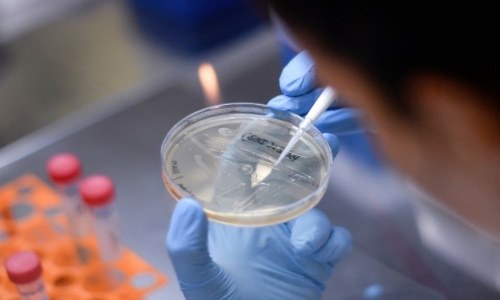A study by the Dow University of Health Sciences in Karachi has revealed that certain variants of a human gene may offer resistance against the novel coronavirus, called SARS-CoV-2, which has infected more than 1.5 million people globally and killed tens of thousands.
The SARS-CoV-2 is a strain of the coronavirus, which also caused the severe acute respiratory syndrome and Middle East respiratory syndrome. The new strain of the coronavirus, however, has proven to be the most difficult to deal with, due to its fast spread.
The research by Dow University, which has been reviewed by peers and published in the Journal of Medical Virology, says that two variants of the ACE2 (angiotensin I converting enzyme 2) gene — that has been established as the functional receptor for the novel coronavirus — may make a person more resistant to the infection.
The research team, led by Dow College of Biotechnology's Vice Principal Dr Mushtaq Hussain, observed the binding of different variants of the ACE2 gene with the new coronavirus and noted that most of them "showed similar binding affinity for SARS-CoV-2 spike protein as observed in the complex structure of wild type ACE2 and SARS-CoV-2 spike protein".
However, the research team said that two allelic variations of the ACE2 gene, identified as S19P and E329G, "showed noticeable variations in their intermolecular interactions" with the virus.
The researchers studied mutations in ACE2 after examining over a thousand samples of the gene obtained by genomic data mining. The molecular structures of the variant genes were created by homology modelling. According to Dr Hussain, genome data had been extracted from individuals residing in China, Latin America and some European countries.
It should be noted that considering the number of countries that have been hit by Covid-19, the number of variants studied is quite low.
It is also pertinent to mention that the research does not suggest that the person who possesses the variants would become immune to the virus. They would not, however, experience severe symptoms and may only need to be isolated for two weeks.
Dow University's Vice Chancellor Muhammad Saeed Quraishy congratulated the research team on their findings and expressed hope that studies like these would enable the world in finding a way to curb the virus.



































